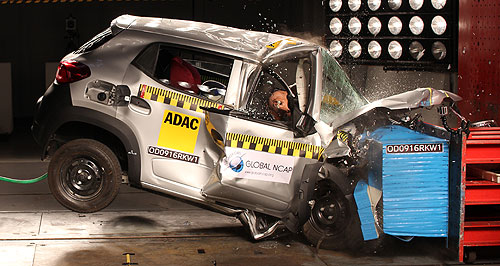Make / Model Search
News - General News - SafetyClean sweep of zero stars for five Indian carsNot the full Kwid: The Renault Kwid crumpled like an aluminium can in the latest round of NCAP tests in India. Global NCAP slams motor manufacturers for dishing up substandard cars in IndiaGallery Click to see larger images 18 May 2016 ALL five cars assessed in the latest round of Global New Car Assessment Program (NCAP) crash safety tests in India have been awarded zero stars. The result is a damning indictment of the car-makers in India and their indifference to car occupant protection, despite having been shamed in previous safety assessments for sub-standard vehicles such as the Datsun Go and Maruti Suzuki Swift. The latest tests involve the Renault Kwid hatchback, Mahindra Scorpio SUV, Maruti Suzuki Eeco minivan and Celerio hatchback and Hyundai Eon hatchback, none of which were fitted with the safety equipment commonly found in western cars – airbags (front, side or curtain), seatbelt pretensioners, four-channel ABS brakes, seatbelt reminders or Isofix child seat anchorages. At Renault’s request, Global NCAP – an organisation set up to monitor crash safety standards in developing markets such as India, Latin America and Africa – later tested an updated version of its Kwid, including one equipped with a driver’s airbag, but even that was insufficient to earn a star. The re-tested Kwid did not collapse as badly as the initial test vehicle because of additional body strengthening in the updated version, but when NCAP engineers closely examined the structure, they found that only the driver’s side had been strengthened. Of the five vehicles in the initial test round, only the Maruti Suzuki van scored any points at all in adult protection – 1.13 points out of a maximum 17. The other four scored nil. The Maruti Suzuki Eeco also did best in child passenger protection, winning 24.2 points out of a possible 49, although that rated only two stars. But Maruti Suzuki’s other contender, the Celerio, could not manage even that lowly score, getting just one star in child protection, thanks to “excessive forward movement” of the three-year-old’s child seat and “biomechanical readings above the limits”. In announcing the results, Global NCAP secretary general David Ward singled out the lack of bodyshell crash stability in the tested vehicles, saying it was “absolutely crucial for occupant safety”. This tin-foil body construction is evident on all of the latest Indian test images, but no more so than on the initial Renault Kwid which buckled as far back as the C pillar. Ripples in the panels can be seen across the roof, while even the floor pan can be seen to have a sharp bend. In western markets, where a four-star rating these days causes shock waves, this would be unacceptable. Mr Ward said the result of the tests highlighted the importance of the Indian government’s decision to mandate front and side impact crash tests from October 2017. “Legislative action is needed to ensure that the minimum levels of occupant protection recommended by the United Nations are guaranteed for Indian consumers,” he said. “But manufacturers don’t have to wait for legislation, and we urge them to act to eliminate all zero-star cars from production as soon as possible.”  Read more |
Click to shareGeneral News articlesResearch General News Motor industry news |

















Facebook Twitter Instagram